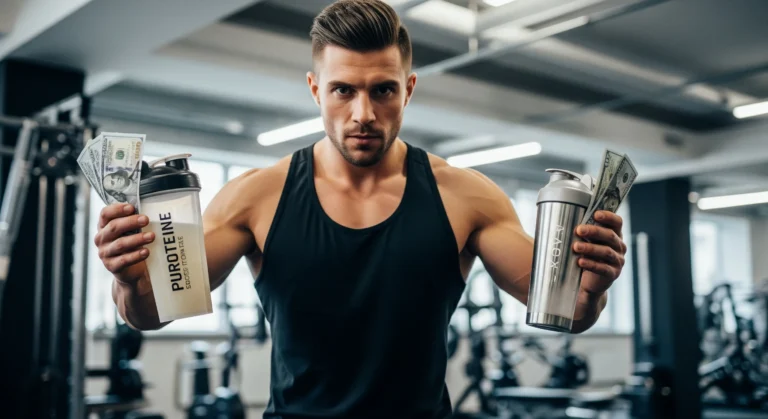
Did you know that 73% of gym-goers experience at least one negative side effect from pre-workout supplements? I learned this the hard way when I nearly passed out during a leg day after trying a new pre-workout blend that promised “explosive energy.”
Let me tell you, there’s nothing explosive about face-planting next to the squat rack! That embarrassing moment taught me that pre-workouts aren’t just harmless powder you mix with water.
While these supplements can genuinely boost your energy and performance, they’re not without risks. The fitness supplement industry isn’t as regulated as you might think, and some popular ingredients can cause everything from mild jitters to serious heart palpitations. I’ve seen too many people in my years of training make the same mistakes I did.
In this guide, I’ll walk you through the most common pre-workout side effects, warning signs to watch for, and practical tips to minimize risks while still getting the performance boost you’re after!
Most Common Pre-Workout Side Effects You Need to Know
After years of experimenting with different pre-workouts and watching countless gym members go through the same trial and error, I’ve noticed some pretty consistent patterns. These side effects aren’t just inconvenient – they can seriously mess with your workout and your day.
The jitters are probably the most obvious one. You know that feeling when you’ve had way too much coffee? That’s what happens when you slam down a pre-workout with 400mg of caffeine without checking the label first. I used to think more caffeine meant better workouts, but I was wrong.
Your hands start shaking, your heart feels like it’s trying to escape your chest, and focusing on proper form becomes nearly impossible. I remember trying to bench press while jittery – not a good combo when you’re dealing with heavy weights above your face.
Then there’s the inevitable crash. What goes up must come down, right? About 2-3 hours after taking most pre-workouts, you’ll hit a wall harder than a linebacker. I used to plan my workouts around this crash because I knew I’d be useless for the rest of the day.
Digestive issues are another biggie that nobody really talks about. Nausea, stomach cramps, and sometimes worse – if you know what I mean. This usually happens when you take pre-workout on an empty stomach or when certain artificial sweeteners don’t agree with your gut.
Sleep problems are sneaky too. Even if you take your pre-workout at 2 PM, those stimulants can still be messing with your sleep at midnight. I learned this lesson when I spent three nights tossing and turning after switching to a new formula with extended-release caffeine.
The tingling sensation from beta-alanine freaked me out the first time it happened. It feels like tiny ants crawling under your skin, usually starting in your face and hands. It’s harmless, but man, it’s weird when you’re not expecting it.
Serious Pre-Workout Side Effects That Require Immediate Attention
Now let’s talk about the scary stuff – the side effects that mean you need to stop what you’re doing and possibly seek medical attention. I’m not trying to scare you, but I’ve seen some situations that could’ve been really dangerous if ignored.
Heart palpitations are the big red flag. If your heart starts beating irregularly, skipping beats, or you feel like it’s going to pound out of your chest, that’s not normal workout intensity. That’s your cardiovascular system telling you something’s wrong.
I had a training partner who ignored heart palpitations for weeks, thinking it was just “part of getting amped up.” Turns out he had an underlying heart condition that made stimulants dangerous for him. Don’t be that guy.
Chest pain or difficulty breathing during or after taking pre-workout is another immediate stop sign. This isn’t the good kind of “I can’t breathe because I’m working so hard.” This is your body waving a giant red flag.
Severe dizziness or fainting episodes are more common than you’d think, especially when people stack multiple stimulants or take pre-workout on an empty stomach. I’ve helped carry more than one person out of the gym who pushed through warning signs they should’ve heeded.
Allergic reactions can range from mild skin rashes to full-blown anaphylaxis. Some people are sensitive to artificial dyes, specific amino acids, or other additives. If you break out in hives or have trouble breathing after taking a new pre-workout, that’s your body’s way of saying “nope.”
Blood pressure spikes are particularly dangerous for people who already have hypertension. Stimulants can push your blood pressure into dangerous territory, and you might not even realize it’s happening until it’s too late.
Ingredient-Specific Side Effects and What Causes Them
Let’s break down what’s actually causing these problems. Understanding the ingredients helps you make better choices and avoid the ones that don’t work well with your body.
Caffeine is the obvious culprit for most side effects. Most people can handle about 400mg per day safely, but pre-workouts often pack 300-400mg in a single serving. Add your morning coffee, and you’re way over the safe limit.
I used to drink coffee in the morning, take pre-workout before lunch workouts, then have an energy drink in the afternoon. No wonder I felt like garbage! Now I track my total daily caffeine intake, and it’s made a huge difference.
Beta-alanine causes that weird tingling sensation I mentioned earlier. It’s called paresthesia, and while it’s harmless, it can be pretty uncomfortable. The tingling usually starts about 15 minutes after taking it and can last for an hour or more.
Some people love the beta-alanine tingles because it makes them feel like the supplement is “working.” Personally, I find it distracting during workouts, so I look for pre-workouts with smaller doses or time-released versions.
Niacin (Vitamin B3) causes flushing – that hot, red, prickly feeling on your skin. It’s not dangerous, but it can be uncomfortable and alarming if you’re not expecting it. Some companies use niacin to create a “warming” sensation that makes you think the product is more powerful than it actually is.
Artificial sweeteners like sucralose and acesulfame potassium can cause digestive issues in sensitive people. Bloating, gas, and diarrhea are common complaints. If you notice digestive problems only on days you take pre-workout, the sweeteners might be the culprit.
Proprietary blends are the worst offenders because you can’t see individual ingredient amounts. Companies hide behind these blends to use tiny amounts of expensive ingredients while loading up on cheap fillers and stimulants. Always avoid products that don’t list specific amounts for each ingredient.
How to Minimize Pre-Workout Side Effects Safely
Here’s where experience really pays off. After years of trial and error (and some pretty uncomfortable workouts), I’ve figured out how to get the benefits while minimizing the downsides.
Start with half doses, seriously. I don’t care what the label says or how tough you think you are. Your first time with any new pre-workout should be half a scoop or less. You can always take more next time, but you can’t un-take what you’ve already consumed.
I learned this lesson the hard way with a pre-workout that had 450mg of caffeine per scoop. Half a scoop was perfect for me, but being stubborn, I used the full amount and spent my entire workout feeling like I was going to vibrate out of my skin.
Timing matters more than most people realize. Take your pre-workout 20-30 minutes before you plan to start lifting, not the moment you walk into the gym. This gives the ingredients time to kick in properly without hitting you all at once during your warm-up.
Also, avoid taking pre-workout within 6 hours of bedtime. I used to think I was the exception to this rule until I started tracking my sleep quality. Even when I felt tired, the stimulants were preventing deep, restorative sleep.
Hydration is absolutely critical. Pre-workouts can be dehydrating on their own, and when you add intense training and sweating, you’re setting yourself up for headaches and cramps. I drink at least 20 ounces of water with my pre-workout and keep sipping throughout my session.
Food timing is tricky. Taking pre-workout on a completely empty stomach can cause nausea and make the effects hit too hard and fast. But taking it right after a big meal can slow absorption and reduce effectiveness. I usually have a small snack (like a banana) about an hour before my pre-workout.
Cycling off pre-workout every 6-8 weeks helps prevent tolerance buildup. Your body gets used to the stimulants, and you’ll need more and more to get the same effect. Taking a week or two off resets your sensitivity and keeps the supplements working effectively.
When to Stop Taking Pre-Workout Supplements
Knowing when to quit is just as important as knowing how to use these supplements safely. There are some clear warning signs that your body isn’t handling pre-workout well, and ignoring them can lead to serious problems.
If you’re experiencing persistent side effects that don’t improve after adjusting your dose or timing, it’s time to stop. Your body is trying to tell you something, and pushing through isn’t going to make things better.
Certain medical conditions make pre-workout supplements particularly risky. If you have high blood pressure, heart problems, anxiety disorders, or are taking medications for any of these conditions, you need to talk to your doctor before using stimulant-based supplements.
I had a friend with anxiety who thought pre-workout would help her feel more confident in the gym. Instead, it triggered panic attacks that made working out impossible. Mental health conditions and stimulants don’t always mix well.
Age is another factor people don’t always consider. As we get older, our bodies process stimulants differently, and we become more sensitive to their effects. What worked fine at 25 might cause problems at 45.
If you’re taking medications, especially for heart conditions, blood pressure, or mental health, pre-workout ingredients can interact with your prescriptions in dangerous ways. Always check with your pharmacist or doctor about potential interactions.
The withdrawal symptoms from stopping pre-workout can be real too. Headaches, fatigue, and irritability are common when you’ve been using high-stimulant products regularly. Tapering off gradually rather than stopping cold turkey can help minimize these effects.
Sometimes the best alternative is no supplement at all. Natural energy boosters like adequate sleep, proper nutrition, and maybe just some green tea can be surprisingly effective without any of the side effects.
Conclusion
Pre-workout supplements can be powerful tools for enhancing your gym performance, but they’re definitely not risk-free. The key is being informed about potential side effects and actually listening to your body’s signals instead of just pushing through discomfort.
Remember, everyone’s tolerance is completely different. What works perfectly for your gym buddy might leave you feeling anxious and jittery for hours. Start slow, pay attention to how your body responds, and don’t ignore warning signs just because you want that extra energy boost.
If you’re experiencing persistent side effects, consider switching to a milder formula or exploring natural alternatives like green tea or beetroot juice. Your long-term health is way more important than one intense workout, and there are plenty of ways to get energized without risking your wellbeing.
The supplement industry wants you to believe that more is always better, but that’s not how your body works. Sometimes less is more, and sometimes natural energy is the best energy.
Have you experienced any unexpected side effects from pre-workout supplements? Share your experiences in the comments below – your story might help someone else stay safe while pursuing their fitness goals!



